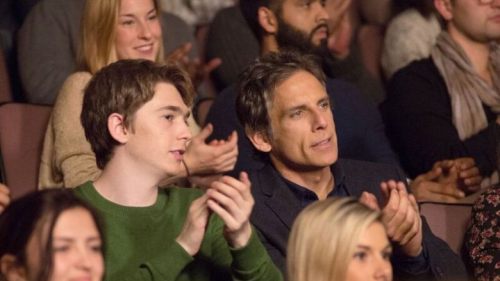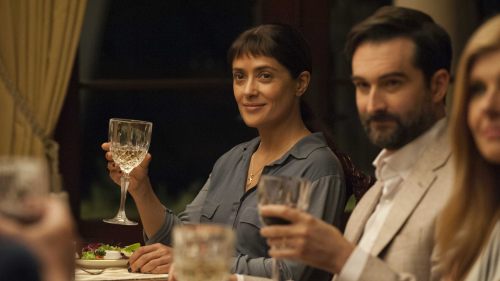TIFF 2017 Exclusive Interview: Mike White On BRAD’S STATUS
From School of Rock through Chuck and Buck, Mike White has cemented himself as a clever, iconoclastic writer unafraid to take characters that should be obnoxious or conventional and bring audiences around to their side. His writing is insightful without being flashy, clever without calling attention to itself, garnering him fans for his many disparate projects.
His latest film, Brad’s Status, focuses on the self-doubt and jealousies of a middle aged father – hardly the stuff of bristling indie cred. Yet under White’s care, the story of a man, his son and the friends whose success Brad pits himself against proves to be as witty and insightful as any arthouse fare, with the added bonus of being immensely entertaining.
We spoke to White during the Toronto International Film Festival about his work, his own jealousies, and the pitfalls he avoided in making this project.
In the first line of my review I talk a little bit about how I think you have to be a little bit defensive about the subject matter of the film. Could you talk about addressing pitfalls while writing it, given the current political climate?
I've made a career out of writing protagonists where maybe people's compassion wouldn't go for them initially, whether it was Chuck and Buck or Molly Shannon's character. They test your ability to feel compassion for them. When you meet them you put them in a box, and then they reveal themselves. Your hope as a dramatist is that you can actually create not just a feeling of sympathy for the character but something where you recognize yourself. In this climate [Brad] is one of the hardest types of characters to get an audience to feel compassion for. He's got a good life, he's got all of the privileges of a certain identity if you think of it in those terms, and he's kind of self-pitying, self-mythologizing dude. At the same time, I felt it'd be interesting to try to get inside that guy's head, feel what he feels, and maybe you come out with some kind of different idea of what that is. I certainly have the anxieties that he has sometimes, comparing myself to others, or having ego needs and being insecure. It's not the coolest part of myself, but it exists. It's like he says, “you may see me as a cliché, but this is my life!” Even people who have a lot can have pain. You don't have to feel sorry for them, but I think it's still worth considering and it made me want to try to write it.
What do you think is the biggest misconception some of your own fans might have about your own position and fame? Here you are, you're a successful Hollywood director who's getting big name actors to be in his movies, and still you feel insecure.
I don't feel I should be insecure. But, you have a movie come out, and thankfully we've gotten a lot of good reviews, but I feel like sometimes it's like this [doing interviews] is the worst part of creating for me. It makes me self-conscious and you want to have a zen namaste attitude about it. But it's inevitable to take a few hits to the ego. Yeah, I'll look at my Rotten Tomatoes aggregate number, the box office. It's like a casino. Even if you're winning, you're going to end up losing, so get out of the casino. How do you pull out of that kind of need for these external affirmations for your work or yourself or your life? It's hard, but it's something that is, you know.
You are creating something on a blank piece of paper and thinking that it has to go that way. Do you ever get half way through and think oh my God, what am I doing here, or do you build confidence?
For the stories that I come up with the writing part of it is still kind of pure. I get inspired and follow that road. It's only when at the end of the whole journey and release it into the world you go, oh yeah, people see me this way, or they see my work this way, or this critic always hates me. You come to Toronto, it's your movie and you realize, oh, there are 50 other fucking movies and you're not the only child of the universe. That's a stupid thing to have to remember, but we all want to be special, we all want to feel like we're the stars of our own story, you know? You want to be enlightened, but there are times when the realization that it's not all about you is something that you have to relearn time and time again.
Please talk about picking Brad’s friends for their small scenes.
The casting was crucial. [The scenes are] just small little bursts. Luke Wilson and I had worked together on Enlightened and I loved working with him. I thought he's the kind of guy that for that character, the hedge fund guy, that he would bring a humanism to him. Jemaine Clement I've worked with before. He's not a nerd, [but] he's not a party animal by any measure. He's happily married and doesn't drink. I thought it would just be funny to have him being the one who is living this debauched life with two chicks. With me it was just the practicality - it was a character that had no lines but had to shoot in Honolulu and Montreal and Boston. The guy who plays my husband in it is the director of photography, and Luke's wife in the movie is our costume designer. It was people that we knew had to come to all of these places anyway, so we were just trying to save some money.
…And Michael Sheen?
Michael Sheen I just think is an incredible actor. That [dinner] scene was 17 pages in the script so I knew I needed somebody who is a truly trained thespian. He was a guy who showed up, knew all of his lines, and could interpret them. If you gave him a thought, he could synthesize it and take it globally throughout the whole scene.
As for casting your lead?
Well, Ben, in a way I [worried] that it was too on the nose. There are no real jokes in the movie. There are these melancholy streaks and the comedy comes out of that. It's all really in these nuances that I thought it was kind of interesting to start it off and think that maybe you're seeing a more familiar version of Ben Stiller, and then subvert that in some way.
Part of those expectations come from him butting up against the other performances that these guys have done that we’re already familiar with.
With Ben, I think he was more concerned with that than I was. I don't really hold all of his performances in my head, or think about that. He'd be like, oh, I did something like that recently in whatever. I think like any great actor doesn't want to repeat himself and wants to try something new. As far as those guys' work, I mean, those guys are so specific and I'm pretty specific. There's a warmth to Ben here that I think is a little bit more of an emotional performance than maybe some of those movies are, but it's hard for me as an artist to quantify it. I don't want it to be an acidic portraiture, and he didn't want it to be that either.
Jenna Fischer obviously has what should be a thankless role, but absolutely puts incredible humanity into it when she's on the screen, as does Austin Abrams as the son.
Jenna is a friend of mine. I thought she would bring this kind of quality that you could tell, they're the yin and yang - he's all Agon and agita and she's grounded and happy. He almost doesn't respect her for that, and Jenna seemed like she would just nail that. For Austin, he put himself on tape and he was a fully born character. I didn't give him much in the way of direction, he could teach a class on naturalism in acting, he's just very unmannered. There's just something very real about him.
This is a question I often ask - what is the first work that you saw that made you think you can do this?
The play Who's Afraid of Virginia Woolf? I remember getting the book and the script and seeing how the words were on the page. There's something pleasing to the names and then the dialogue. I really fell in love with writing, using dialogue as a way to express myself. That was the start of really thinking this is something I want to do whether I get paid to do it or not, a way to express myself.


